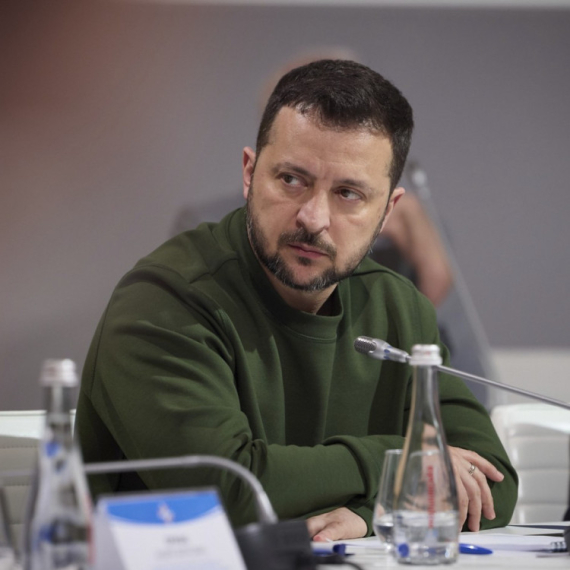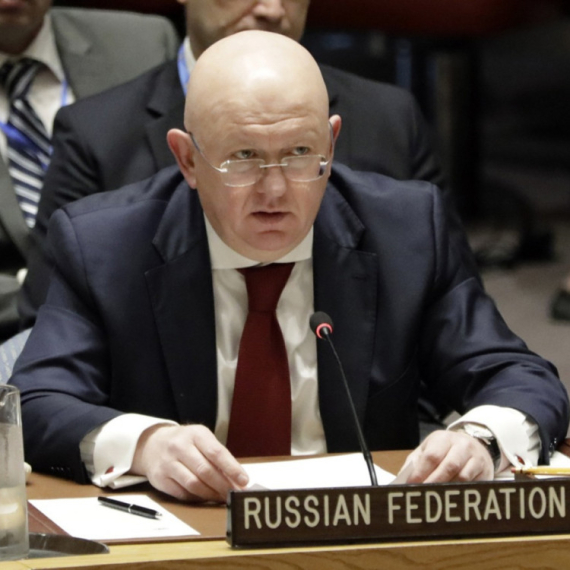Government: IMF agreement implemented
An International Monetary Fund (IMF) mission, led by Albert Jaeger, began its visit to Serbia today with meetings with the country's top officials.
Tuesday, 09.02.2010.
09:57

An International Monetary Fund (IMF) mission, led by Albert Jaeger, began its visit to Serbia today with meetings with the country's top officials. "It has been confirmed at the meeting between Prime Minister Mirko Cvetkovic and Finance Minister Diana Dragutinovic and the IMF mission that all elements of agreement are implemented," the government said in a statement. Government: IMF agreement implemented “The IMF representatives have determined that the negative consequences of the economic crisis in Serbia in 2009 were alleviated by the government’s measures and that our country has ended last year with better macroeconomic indicators than other Eastern European countries,” the announcement reads. During the IMF mission’s visit to Belgrade, which will last until February 23, the monetary and macroeconomic trends and implementation of the agreed measures will be reviewed. As a part of the regular annual consultations which are conducted simultaneously with the revision of the EUR 2.9bn loan arrangement, a medium-term strategy of Serbia's economic policy will be also be analyzed, it has been announced. Another issue under the microscope during the meetings will be competitiveness and stability, as well as sustainability of the country’s foreign debt. The IMF mission started its visit today with an introductory plenary meeting at the National Bank of Serbia (NBS). On May 15, 2009 the IMF approved EUR 2.9bn loan for strengthening of the country's foreign exchange reserves, and two tranches, totaling EUR 1.12bn, have been withdrawn so far. The withdrawal of the third installment worth EUR 350mn will depend on the IMF mission’s new report, that will be complied after the current visit. The central bank’s plan is to make the transaction in May of this year. According to the agreement Belgrade has with the IMF, Serbia is obligated to cut expenditures set aside for budget users, meaning that these salaries, just like pensions, must remain frozen in 2010. The agreement also envisages downsizing of the state administration and adoption of a new law regulating pension and disability insurance issues. NBS Governor Radovan Jelasic stated that he was a moderate optimist that the talks with the IMF would be successful. “Like in the past nine years, there are some agreed upon obligations, which have not been completely fulfilled, and that will be discussed,” he said. During the regular third revision of the current loan arrangement, the IMF delegation will assess the economy and the macroeconomic situation in Serbia in the middle and long terms, the central bank governor said. He pointed out that the main topics during the next two weeks would be ways to reduce public expenditure and increase investments, including production and export. The governor stressed that the government had assumed the obligation to reform the pension system and cut down appropriations for the earnings of the budget users. According to Jelasic, expert teams of the government and the IMF will discuss this in detail during the next few days. If the IMF report were to be positive, according to the governor, Serbia should withdraw a third tranche from the worth EUR 350mn, which would meet the 300 percent of Serbia’s quota in the IMF, which brings with it minimum interest rate. “We are hoping that the remaining funds from the loan will not be necessary, because an additional two percent interest rate is paid for them,” he said. Ahead of the meetings today, economic analyst Goran Nikolic said that he expects the government's talks with the IMF to be successful, because the readiness was seen for a start in the reforms of the pensions system, which was what interested the Washington delegation the most. “There are two elements in question, subsidized length of service and the future model by which pensions will be harmonized. This is expected to be organized according to consumer products and cost of living, with corrections to be made if the gross domestic product is greater than four percent, to influence the pensions as far as their increases are concerned, by a growth of four percent,” Nikolic said. During the IMF mission’s stay, which is expected to last until February 23, new fiscal, monetary and macroeconomic corrections and the realization of already agree structural measures will be discussed. Nikolic expects that the IMF will also ask for guarantees from the government for budget holes being filled as promised. “As far as the exchange rate of the dinar is concerned, the IMF is only concerned with its stability,” he added. He said that it is enough to see industrial increases in one three-month period for announcing the end of the recession, and claimed that some economic growth can be expected. Despite this prognosis, Nikolic said that the people will not be living any better, adding that wages will not increase and there will be an increase in the inflation rate as well.
Government: IMF agreement implemented
“The IMF representatives have determined that the negative consequences of the economic crisis in Serbia in 2009 were alleviated by the government’s measures and that our country has ended last year with better macroeconomic indicators than other Eastern European countries,” the announcement reads.During the IMF mission’s visit to Belgrade, which will last until February 23, the monetary and macroeconomic trends and implementation of the agreed measures will be reviewed.
As a part of the regular annual consultations which are conducted simultaneously with the revision of the EUR 2.9bn loan arrangement, a medium-term strategy of Serbia's economic policy will be also be analyzed, it has been announced.
Another issue under the microscope during the meetings will be competitiveness and stability, as well as sustainability of the country’s foreign debt.
The IMF mission started its visit today with an introductory plenary meeting at the National Bank of Serbia (NBS).
On May 15, 2009 the IMF approved EUR 2.9bn loan for strengthening of the country's foreign exchange reserves, and two tranches, totaling EUR 1.12bn, have been withdrawn so far.
The withdrawal of the third installment worth EUR 350mn will depend on the IMF mission’s new report, that will be complied after the current visit.
The central bank’s plan is to make the transaction in May of this year.
According to the agreement Belgrade has with the IMF, Serbia is obligated to cut expenditures set aside for budget users, meaning that these salaries, just like pensions, must remain frozen in 2010.
The agreement also envisages downsizing of the state administration and adoption of a new law regulating pension and disability insurance issues.
NBS Governor Radovan Jelašić stated that he was a moderate optimist that the talks with the IMF would be successful.
“Like in the past nine years, there are some agreed upon obligations, which have not been completely fulfilled, and that will be discussed,” he said.
During the regular third revision of the current loan arrangement, the IMF delegation will assess the economy and the macroeconomic situation in Serbia in the middle and long terms, the central bank governor said.
He pointed out that the main topics during the next two weeks would be ways to reduce public expenditure and increase investments, including production and export.
The governor stressed that the government had assumed the obligation to reform the pension system and cut down appropriations for the earnings of the budget users.
According to Jelašić, expert teams of the government and the IMF will discuss this in detail during the next few days.
If the IMF report were to be positive, according to the governor, Serbia should withdraw a third tranche from the worth EUR 350mn, which would meet the 300 percent of Serbia’s quota in the IMF, which brings with it minimum interest rate.
“We are hoping that the remaining funds from the loan will not be necessary, because an additional two percent interest rate is paid for them,” he said.
Ahead of the meetings today, economic analyst Goran Nikolić said that he expects the government's talks with the IMF to be successful, because the readiness was seen for a start in the reforms of the pensions system, which was what interested the Washington delegation the most.
“There are two elements in question, subsidized length of service and the future model by which pensions will be harmonized. This is expected to be organized according to consumer products and cost of living, with corrections to be made if the gross domestic product is greater than four percent, to influence the pensions as far as their increases are concerned, by a growth of four percent,” Nikolić said.
During the IMF mission’s stay, which is expected to last until February 23, new fiscal, monetary and macroeconomic corrections and the realization of already agree structural measures will be discussed.
Nikolić expects that the IMF will also ask for guarantees from the government for budget holes being filled as promised.
“As far as the exchange rate of the dinar is concerned, the IMF is only concerned with its stability,” he added.
He said that it is enough to see industrial increases in one three-month period for announcing the end of the recession, and claimed that some economic growth can be expected.
Despite this prognosis, Nikolić said that the people will not be living any better, adding that wages will not increase and there will be an increase in the inflation rate as well.


























































Komentari 2
Pogledaj komentare